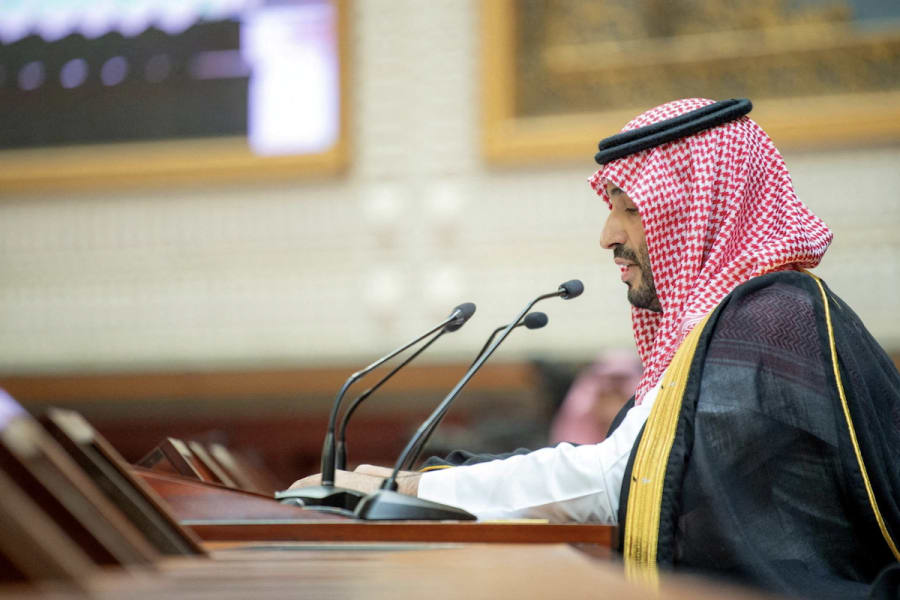Why is Saudi Arabia pivoting towards Iran? The recent, rare public criticism of Israel by MBS may have been for the US

Saudi Arabian Crown Prince Mohammed bin Salman (MBS) issued a rare direct criticism of Israel at the recent joint Arab League and Organization of Islamic Cooperation (OIC) summit in the capital city of Riyadh on Monday.
Addressing the summit, MBS said the international community should “immediately halt the Israeli actions against our brothers in Palestine and Lebanon.”
“We call on the international community to uphold its responsibility to maintain international peace and security by immediately ending the Israeli aggression against our brothers in Palestine and Lebanon,” MBS stated.
Going even further, the Saudi crown prince used some of the most critical language he has personally employed since the start of the Gaza War, saying, “The kingdom renews its call for a categorical rejection of the genocide committed by Israel against the brotherly Palestinian people.”
After several years of reports that a normalization agreement between Israel and Saudi Arabia was near completion, bin Salman's comments appeared to take many, especially in Israel, by surprise.
Just a few months ago, MBS was reported to have said that the Palestinian issue was not really that important to him. Suddenly, on the world stage, he not only put the Palestinian issue front and center, but he also linked it to Iran, Israel’s primary national enemy in the region.
What could have prompted such a great reversal of opinion, and why would the de facto leader of Saudi Arabia – who just four years ago appeared on the brink of normalizing relations with Israel – completely make an about-face?
For those paying attention to the Middle East over the past few years, MBS’ comments may not have come as such a surprise. After all, in March 2023, Saudi Arabia and Iran, which had cut off official communication, engaged in a very public reconciliation through Chinese efforts to bring stability to the region.
Some in the U.S., and also in Israel, were shocked by the development, believing that the Saudi Kingdom preferred to align itself with the West, especially the United States.
However, if we understand why Saudi Arabia undertook this reconciliation with Iran, it becomes clear that the statements of MBS are only a continuation of the same concerns that led him to agree to normalization with Iran, despite a recent history of conflict and competition.
Shortly after the deal was announced, analysts began to question whether it would push the possibility of normalization with Israel further away.
At the time, a senior Israeli official told the Axios news outlet that the normalization deal, negotiated by China, reflected “a feeling of U.S. and Israeli weakness” which started with the Biden administration trying to reimplement the JCPOA nuclear deal in an attempt to reverse the Middle East policy under then-President Donald Trump.
The unwillingness of the U.S. to offer the kingdom a robust package of security guarantees combined with the U.S. catering to Iran, signified an apparent shift in the balance of power in the Middle East. While Trump strengthened Israel's stance in the region, positioning it as a counter to Iranian aggression, the Biden administration has treated Iran as the regional power and sent mixed signals about its support for Israel.
Bin Salman is a pragmatist. He understands that militarily, the kingdom cannot directly challenge Iran. No doubt, he would like to build up his nation’s military capabilities, but until that happens, he needs to align with a strong power that will provide restraint against Iranian aggression.
It is also clear that bin Salman does not trust Iran. Even after the normalization with Iran, MBS said in an interview with Fox News anchor Bret Baier, that if Iran obtained a nuclear weapon, the Saudis would also “have to get one.”
Seeing Biden's perceived weakness in handling Russia's aggression in Ukraine, his hesitation to finalize a security deal that met Saudi Arabia's conditions, and a lack of respect for the Israeli government, MBS appears to have decided that pursuing normalization was necessary to safeguard his country's interests in the short term.
Dr. Dan Diker, president of the Jerusalem Center for Foreign Affairs, recently wrote an article for The Jerusalem Post, in which he argued that Netanyahu, by standing up to Biden over the past few months, and by decisive strikes against Hamas, Hezbollah and Iran, has re-established its position as the Middle East’s dominant power.
The title of Diker’s article, “Israel Is Now the Middle East Strong Horse,” comes from the 2011 book by Lee Smith, The Strong Horse: Power, Politics, and the Clash of Arab Civilizations. In this book, Smith argued that for cultural reasons, the Arab world naturally aligns itself with strength and power, often demonstrated through violence.
Furthermore, the title by Smith comes from a quote by Osama Bin Laden, who in a 2001 interview, said, “When people see a strong horse and a weak horse, by nature they will like the strong horse.”
Smith said that if the U.S. wants to reclaim its position as the dominant influence on the Middle East, it must position itself as the “strong horse.”
Diker argued that over the past six months, Israel has regained its status as the region's 'strong horse.' However, the larger issue is Israel's continued dependence on the U.S., as demonstrated by the recent warning from Secretary of State Antony Blinken and Secretary of Defense Lloyd Austin to Defense Minister Yoav Gallant. Israel still relies on the U.S. for much of its defense supplies. Since Oct. 7, the Biden administration has shown that the U.S. cannot always be counted on to provide unwavering support for its allies during critical national security crises.
Mohammed bin Salman, despite probably being impressed by Israel’s recent achievements, also sees the danger in tying the Saudi Arabian cart to the fickle U.S. horse. The statements against Israel at the summit, therefore, were most likely intended not for Israel but for the United States.
The crown prince wants to know where the new administration of Donald Trump stands regarding Israel’s conflict with Iran. Shortly after the comments from the summit were aired, reports in Israeli media said the Saudi Kingdom also sent an unofficial message to the Israeli government telling them not to be concerned, and that nothing had changed.
The words were directed toward Israel, but the target was Washington, D.C.

J. Micah Hancock is a current Master’s student at the Hebrew University, pursuing a degree in Jewish History. Previously, he studied Biblical studies and journalism in his B.A. in the United States. He joined All Israel News as a reporter in 2022, and currently lives near Jerusalem with his wife and children.













